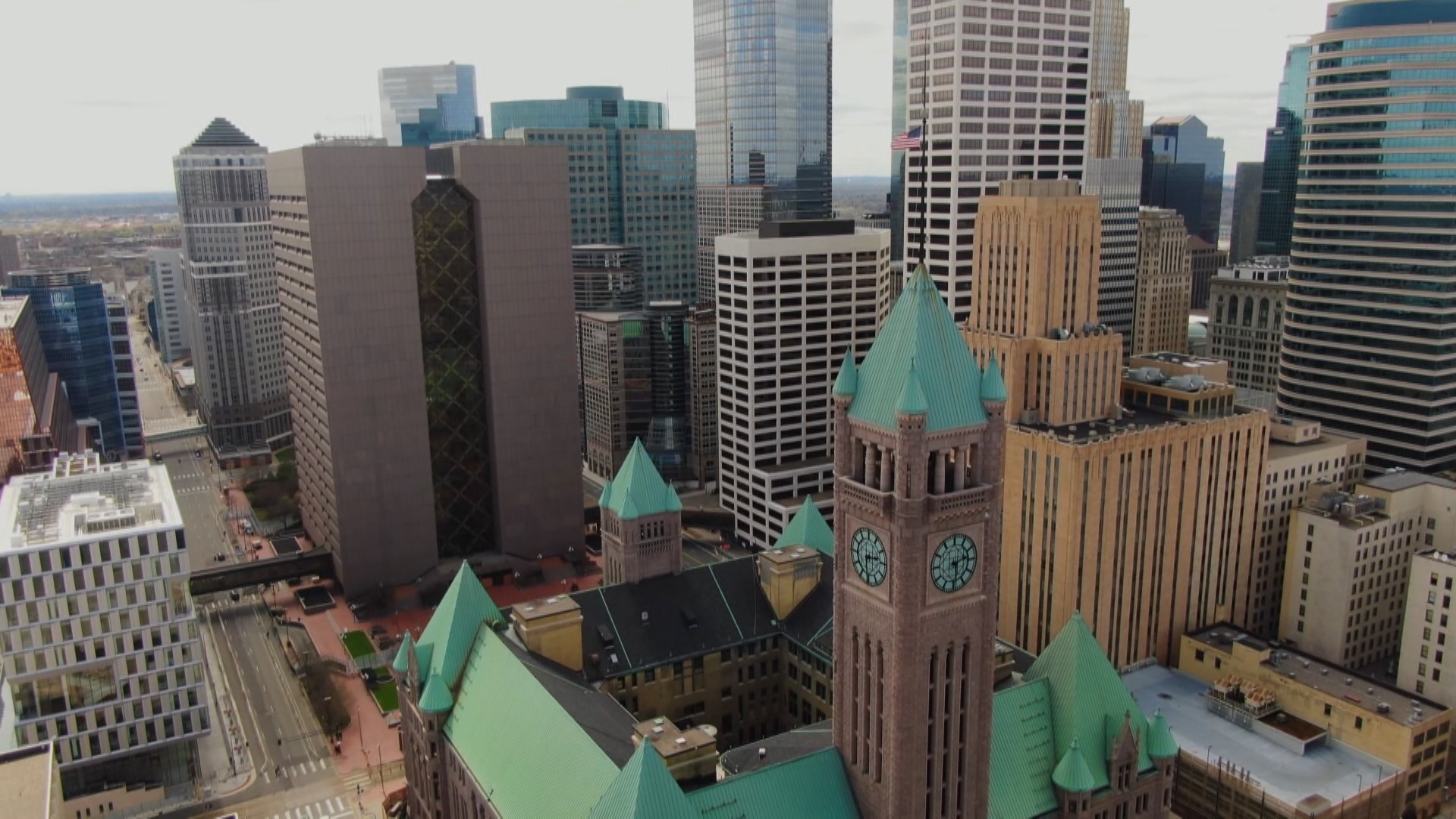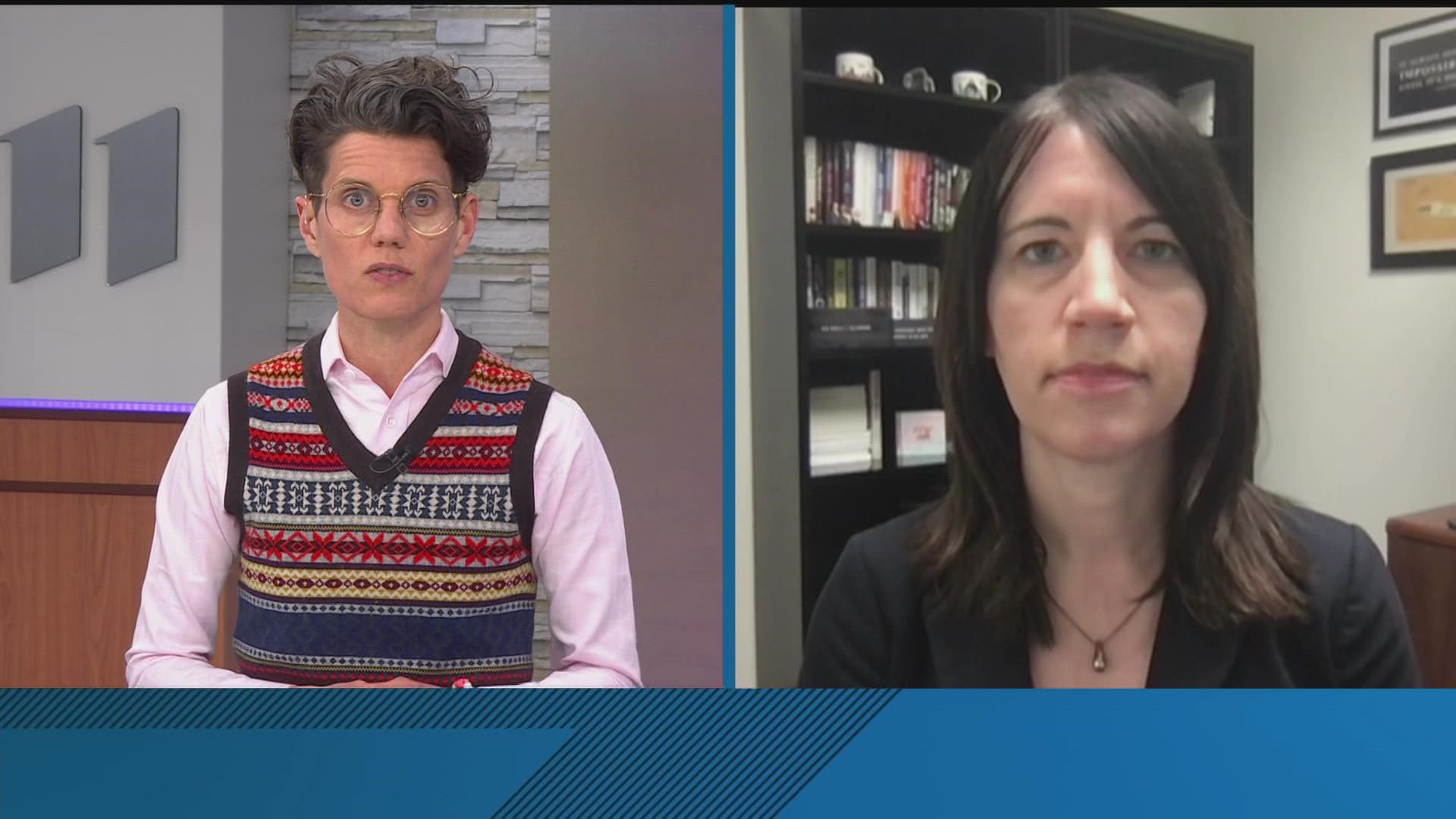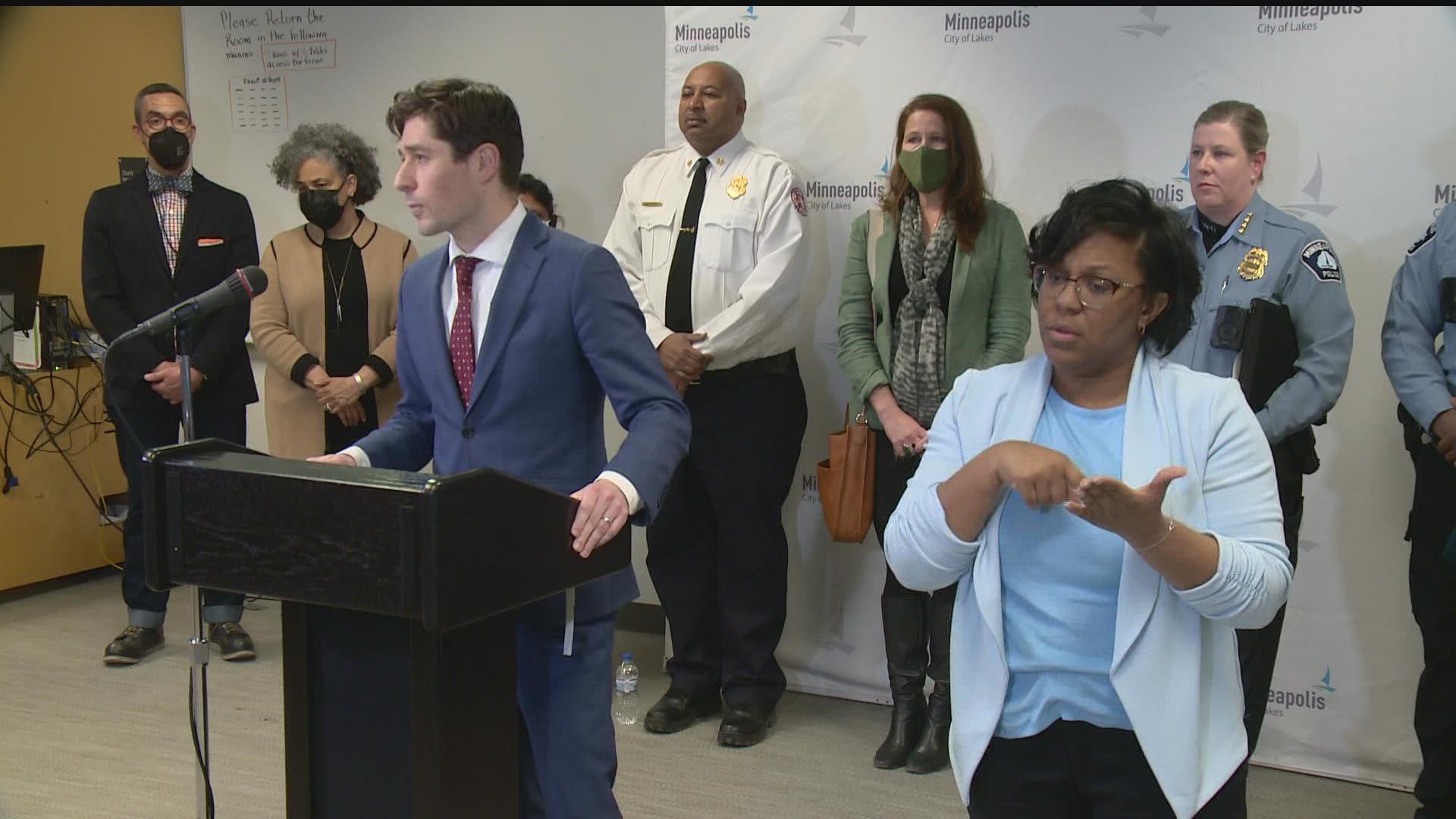Here's what the Department of Human Rights discovered while investigating the MPD
An extensive investigation into the city and Minneapolis police discovered a "pattern or practice of race discrimination" that violates Minnesota's Human Rights Act.

On April 27, 2022, the Minnesota Department of Human Rights released its investigation into the City of Minneapolis and Minneapolis Police Department.
The investigation, which was opened in 2020 following the murder of George Floyd by former Minneapolis officer Derek Chauvin, concluded that "there is probable cause that the City and MPD engage in a pattern or practice of race discrimination in violation of the Minnesota Human Rights Act."
Findings in the 72-page report were based on 700 hours of body-worn camera footage, nearly 480,000 pages of City and MPD documents, about 87 hours of 2021 MPD Academy trainings for new officer hires, multiple ride-alongs with MPD officers, use-of-force incident records, traffic stop data and interviews and statements from thousands of community members about their experiences with the MPD.
The MDHR determined that the city's police department "engages in a pattern or practice of discriminatory, race-based policing. Below are more examples and details pulled from the report that support the department's findings.
Racial disparities in policing
"Racial disparities in how MPD officers use force, stop, search, arrest, and cite people of color, particularly Black individuals, compared to white individuals in similar circumstances." -MDHR report
According to data cited in the MDHR report, since 2010, 13 of the 14 people killed by Minneapolis police officers were people of color or Indigenous individuals.
The investigation concluded that city officers use higher rates of severe force against Black people than white people in similar circumstances, including neck restraints, chokeholds and chemical irritants.
"Although Black individuals comprise approximately 19% of the Minneapolis population, MPD’s data shows that between January 1, 2010, to December 31, 2020, 63% of all use of force incidents that MPD officers recorded were against Black individuals," the report said.
When it comes to issuing disorderly conduct and obstruction violations, which "are often based upon an officer's subjective belief about an individual's behavior," the MDHR found that MPD officers are more likely to use "soft tactics" on white individuals than Black individuals.
The report also determined that MPD officers are more frequently injured when they use neck restraints and when they use inappropriate levels of force.
From Jan. 1, 2010 to Dec. 31, 2020, MPD officers were injured in 20% of cases where they used neck restraints, compared to 8.6% of officers that were injured in cases where they used soft tactics.
MPD officers are also more likely to perform traffic stops on people of color and Indigenous people, particularly when their race is visible to officers. From Jan. 1, 2017 until May 24, 2020, 78% of all searches conducted at MPD traffic stops were searches of Black people or their vehicles. In Minneapolis, Black people make up 19% of the population. In the same time frame, a majority of citations (55%) were issued to Black individuals during traffic stops, according to MPD data.
The report continues to assert that being issued a criminal charge or citation can have long-standing impacts on community members, particularly those in Black communities.
For example, a Black woman told investigators she had to decide between paying her rent or paying a lawyer to challenge a wrongful citation she received from MPD in 2019. "The charge was ultimately dismissed, but as of 2021, this community member was still experiencing homelessness and living in her car," according to the report.
Covert use of social media
"MPD officers’ use of covert social media to surveil Black individuals and Black organizations, unrelated to criminal activity." -MDHR report
Analysis of the MPD's covert social media accounts from Jan. 2010 to Dec. 2020 shows the department did not track and surveil white people unrelated to criminal activity the same way it did with Black people.
Officers used accounts to send friend requests, comment on posts, send private messages and contribute to discussions with Black organizations and individuals.
MPD officers used covert accounts to criticize elected officials while posing as a community member, according to the investigation, and RSVP’d to attend the birthday party of a prominent Black civil rights lawyer and activist.
In 2021, the MPD amended its covert social media policy to require yearly audits of active covert accounts, but there is no policy that requires a "substantive audit of officers' covert social media activity."
Racist and misogynistic language
"MPD officers’ consistent use of racist, misogynistic, and disrespectful language." -MDHR report
According to body camera video, discipline records, statements from community members and interviews with fellow officers, some MPD police officers and supervisors use racial slurs, calling Black people “n*****s” and “monkeys” and Black women “Black b*****s.” Members of the department also used racial slurs against Somali and Latino individuals, and used misogynistic language toward women, including “f*****g c**t” and “b***h.”
The MDHR report said during a sexual assault investigation, “one MPD officer falsely stated that a man could not be guilty of sexually assaulting a woman if they had children together.”
Officers that are subjected to racist and sexist comments often don’t report the abuse because they don’t believe the city and department have reliable accountability systems and “fear retaliation.”
The investigation also found that Hennepin County prosecutors view MPD officers as being much less professional and respectful than officers from other departments around the county.
Deficient training and guidance
"MPD officers, supervisors, and field training officers receive deficient training, which emphasizes a paramilitary approach to policing that results in officers unnecessarily escalating encounters or using inappropriate levels of force." -MDHR report
A review of the Minneapolis Police Department's training materials, witness reviews and training observations found that MPD trainings "reinforce a culture that exacerbates a pattern of race-based policing."
Although the city banned "warrior style training" in 2019, the department still uses a "paramilitary" approach to training. On the first day of Academy training last year, an MPD leader told new hires that "instant and unquestioned compliance is in order," according to the investigation.
Community members also said officers demanded compliance in the most simple interactions, and training materials reflect that the department instills an "us-versus-them" mentality as it pertains to people in the community.
The investigation also claims that the MPD doesn't give officers adequate or appropriate in-service training on updated policies and procedures. For example, after MPD updated its use-of-force policy following the murder of George Floyd in 2020, officers were just given a 15-minute PowerPoint presentation on the topic and a readout of the policy changes.
Superiors and supervisors within the department also lack the proper training and tools to be effective leaders and respond to problems with fellow officers, according to MDHR. One high-level MPD official said that before 2018, the department offered "little to no training" on how to be an effective supervisor.
Based on a review of 300 MPD use-of-force files from Jan. 1, 2010 to Dec. 31, 2020, the MDHR report states supervisors failed to complete thorough reviews of officers' use-of-force in 48.2% of cases.
System issues in the MPD field training program also exasperate patterns of race-based policing. According to the report, body worn camera footage from 2020 showed a training officer allow a trainee to complete a search of an intoxicated Black woman who didn't have any weapons on her.
Two hours later, the same trainer/trainee came across an intoxicated white man who disclosed having a knife in his bag. The trainer told the new officers to skip a search, saying "'I just didn't want you to waste your time,'" according to the investigation.
In many cases, officers also failed to de-escalate situations when it would be appropriate. Looking at a sample of 300 use-of-force files, this happened 56.8% of the time.
A review of 300 files from Jan. 1, 2010 to Dec. 31, 2020 also discovered that in 75.6% of incidents where officers inappropriately use force, another officer failed to intervene when they should have. In 27.9% of all use-of-force incidents, MPD officers failed to provide or request medical attention to community members who needed it, the MDHR report states.
Lack of accountability
"Accountability systems are insufficient and ineffective at holding officers accountable for misconduct."
Under the current oversight structure for the department, almost every investigation into a police misconduct complaint is assessed or guided by sworn MPD officers. The Office of Police Conduct Review and Internal Affairs are "a house with two rooms," according to a high-level MPD official.
The OPCR improperly investigates about 50% of police misconduct complaints, while IA improperly investigates about 25% of police misconduct complaints, the state's investigation concluded.
The average time that it took the OPCR and IA to complete an investigation and for a police chief to issue a final decision from when the misconduct complaint was filed between Jan. 2010 and May 2021 was more than 475 days.
Those delays mean sometimes officers aren't disciplined for misconduct for more than a year or years.
According to the investigation, the MPD has the ability to use data to determine which officers have a greater propensity to use a higher level of force against people of color, indigenous people and/or people experiencing a behavioral or mental health crisis. However, as of Jan. 2022, the MPD hasn't chosen to analyze its data this way.
While the MPD says it has invested in developing a Early Intervention System over the past decade, in practice its EIS is non-existent, the report says.
Lack of urgency and trust
"Former and current City and MPD leaders have not collectively acted with the urgency, coordination, and intentionality necessary to address racial disparities in policing to improve public safety and increase community trust."
In a criminal prosecution, federal and state law requires that prosecutors provide individuals accused of a crime with specific information. However, the City of Minneapolis often still fails to produce impeachment information appropriately, MDHR concluded.
City leaders have acknowledged that the MPD has an internal culture "steeped in racism," and have made several changes to try to address disparities impacting Black people in the community. Among those are creating a juvenile diversion program aimed at decreasing the number of young people that end up in the criminal justice system.
However, the MDHR report points out that some attempts at change by the city and MPD were negatively impacted by a lack of clear communication.
For example, in Dec. 2020 community members were led to believe that the MPD had eliminated requesting no-knock warrants, partly because the city and MPD held a press conference in Nov. 2020 announcing a new "no-knock warrant policy." But in reality, the MPD had not banned no-knock warrants, and the MPD's updated policy just reinforced what SWAT teams had already been allowed to do for years and perform no-knock warrants.
Amir Locke, 20, was shot and killed in a Minneapolis apartment in Feb. 2022 when Minneapolis officers issued a no-knock warrant. The police department repeatedly referred to Locke as a "suspect" following the shooting, when Locke was not a suspect in the case related to the warrant.
Next Steps
Moving forward, the MDHR says it will work with the city to create a consent decree, a court-enforced agreement that identifies specific changes and timelines for those changes to happen.
The following are the three immediate steps the MDHR says the Minneapolis Police Department should move forward with now, but can also be included in the consent decree:
- Make several immediate changes to improve police accountability and oversight
- The MPD must move to improve the quality of its trainings
- City and MPD leaders must communicate honestly with members of the public
More from KARE 11 Investigates
Watch more investigations from the KARE 11 iTeam in our YouTube channel:



